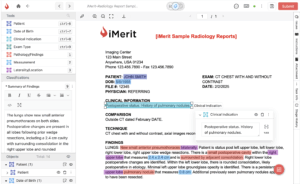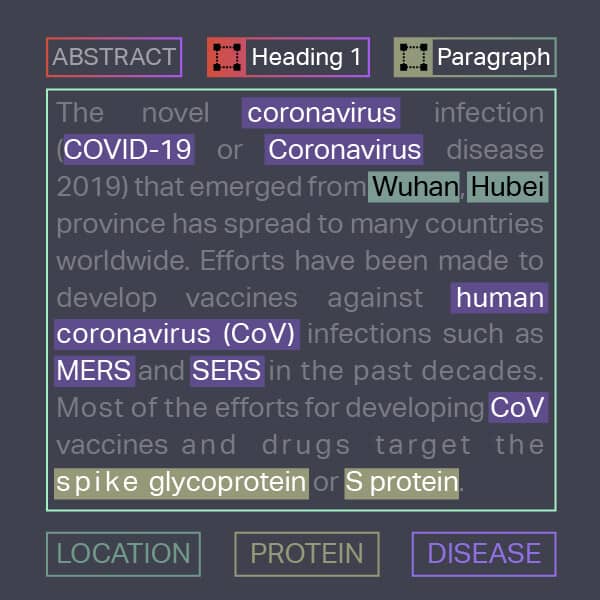Medical text annotation is crucial for developing accurate AI-driven healthcare solutions, particularly in fields such as radiology, oncology, clinical documentation, and medical research. Effective annotation demands advanced annotation technology, deep clinical expertise, stringent regulatory compliance, and robust data security.
Below is a detailed comparison of the top 8 medical text annotation platforms in 2025. These tools support various healthcare use cases, from clinical documentation to research, through automation, compliance, and deep domain knowledge. iMerit stands out for its integration of clinical expertise and secure annotation workflows.
1. iMerit – Comprehensive Annotation Technology, Clinical Expertise, and Robust Security
iMerit offers a robust medical text annotation platform combining advanced annotation tools and AI-assisted labeling with deep clinical expertise. It’s purpose-built for high-stakes healthcare applications, such as radiology reports, oncology datasets, clinical trials, and digital health platforms.
Key Features:
- Advanced Annotation Tools: Entity extraction, symptom identification, disease categorization, diagnostic labeling, medical summarization, detailed text-generation annotation, and complex clinical data labeling.
- Expert Medical Workforce: Dedicated teams including licensed physicians, radiologists, clinical researchers, and healthcare specialists.
- Multi-level Quality Assurance: Rigorous validation involving clinical specialists.
- Scalable & Automated Annotation Pipelines: Efficient, automation-driven workflows.
- Customized Medical Ontologies: Adaptable ontology frameworks.
- Regulatory Compliance & Data Security: Full alignment with HIPAA, GDPR, FDA, and other healthcare regulatory frameworks to ensure data privacy and secure handling.
- Ambient Scribe Integration: Real-time medical transcription and documentation capabilities for EHRs, enabling accurate, hands-free clinical note generation.

2. John Snow Labs – NLP Expertise for Healthcare
John Snow Labs specializes in advanced NLP solutions, tailored specifically for healthcare. It is renowned for extensive linguistic analysis and integration within clinical environments.
Key Features:
- Pre-trained clinical NLP models
- Customizable healthcare-focused NLP pipelines
- Advanced linguistic capabilities
- Strong integration with healthcare applications
3. Shaip – Large-scale Multilingual Medical Annotation
Shaip excels in multilingual and scalable annotation solutions, adept at managing large datasets across global healthcare scenarios.
Key Features:
- Multilingual annotation capabilities
- Scalable processes for vast medical datasets
- Comprehensive quality assurance mechanisms
- Effective global data management
4. MD.ai – Integrated Annotation for Radiology
MD.ai offers specialized annotation solutions that combine medical imaging with clinical text, specifically tailored for radiology use cases.
Key Features:
- Unified medical imaging and text annotation
- Radiology-specific workflows
- Collaborative tools for clinical teams
- Integration with existing imaging AI solutions
5. DiagnosUs (Centaur.ai) – Rapid Clinical Expert Annotation
DiagnosUs leverages crowdsourced annotation from medical experts, prioritizing rapid turnaround and accuracy for urgent medical projects.
Key Features:
- Expert-driven crowdsourced clinical annotation
- Fast turnaround for critical projects
- Clinically validated annotation processes
- Rapid annotation without sacrificing accuracy
6. V7 Labs – AI-enhanced Annotation Solutions
V7 Labs provides annotation platforms enhanced by AI, delivering efficient automation, improved labeling accuracy, and robust dataset management.
Key Features:
- AI-assisted annotation tools
- Advanced automated workflows
- Efficient data version control
- Integration with clinical data systems
7. Annot.ai – AI-driven Efficiency in Medical Annotation
Annot.ai specializes in AI-supported annotation, optimizing efficiency, accuracy, and security specifically for medical text annotation projects.
Key Features:
- Automated entity suggestions for clinical speed
- Customized clinical annotation workflows
- Emphasis on medical data security
- High-speed, high-accuracy annotation
8. Deepen AI – Precision Medical Annotation
Deepen AI focuses on precise annotation solutions specifically designed for clinical accuracy and seamless integration into healthcare AI pipelines.
Key Features:
- Fine-grained clinical entity labeling
- Detailed entity extraction and classification
- Integration with healthcare applications
- Clinical accuracy and regulatory compliance
Why Choose iMerit?
iMerit’s comprehensive annotation technology, extensive clinical workforce expertise, robust security practices, and regulatory compliance uniquely position it to deliver highly accurate, secure, and clinically nuanced annotations. iMerit ensures annotations meet complex healthcare requirements, making it the ideal partner for developing robust healthcare AI solutions.
When clinical accuracy, detailed annotation capabilities, secure data handling, and regulatory compliance matter, iMerit stands out.
Conclusion: Choosing the Right Medical Text Annotation Tools
As healthcare AI evolves, the need for precise, clinically grounded text annotation is more critical than ever. From structuring unstructured EHRs to training NLP models for diagnostics and documentation, your choice of annotation platform has a direct impact on model performance and compliance.
While each of the tools listed brings unique capabilities, whether in multilingual processing, radiology integration, or automation, iMerit stands out for its combination of medical expertise, advanced tools, and secure workflows.
With physician-led teams, adaptable medical ontologies, and robust quality assurance, iMerit delivers the depth, precision, and reliability required for today’s most demanding healthcare AI initiatives.

























